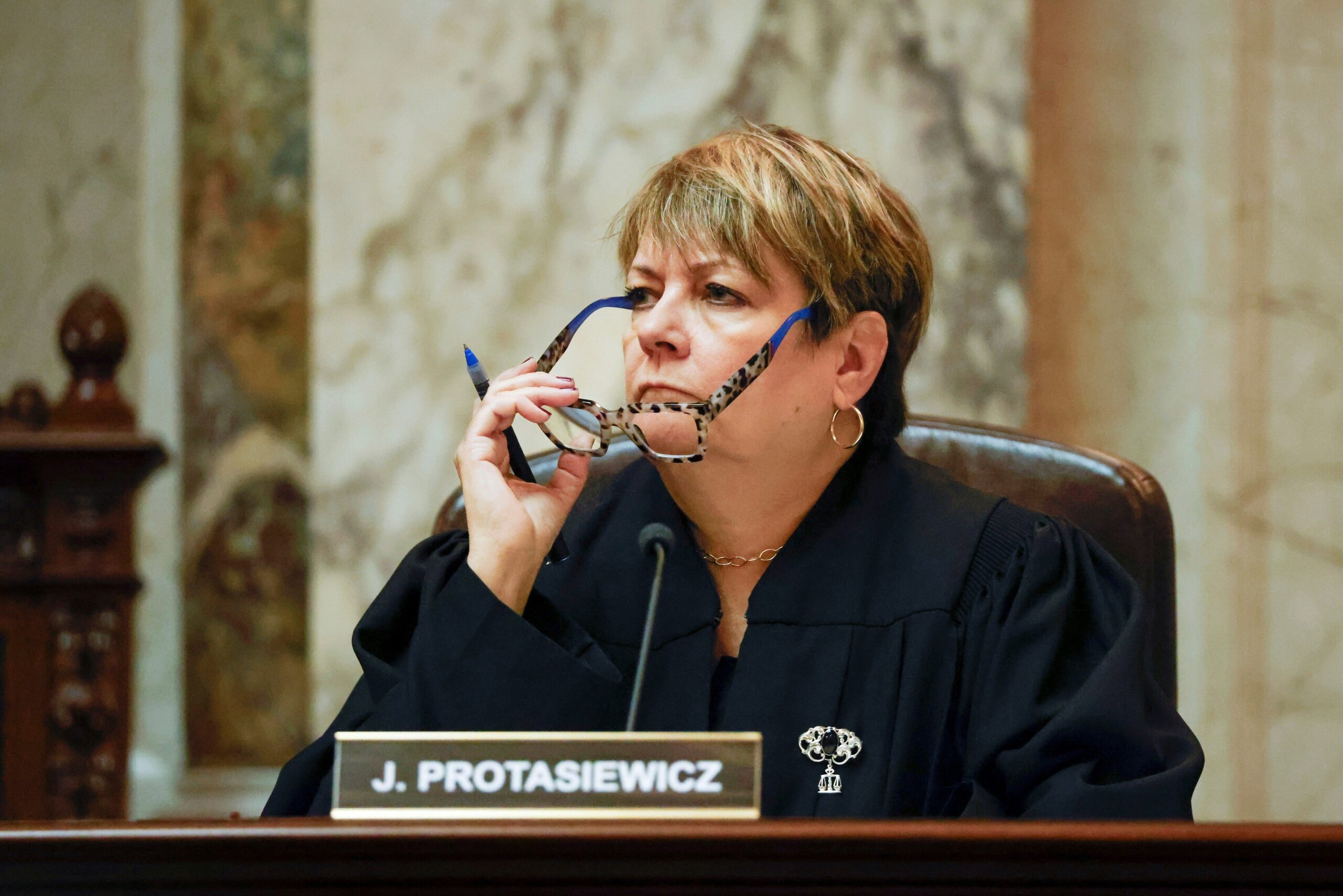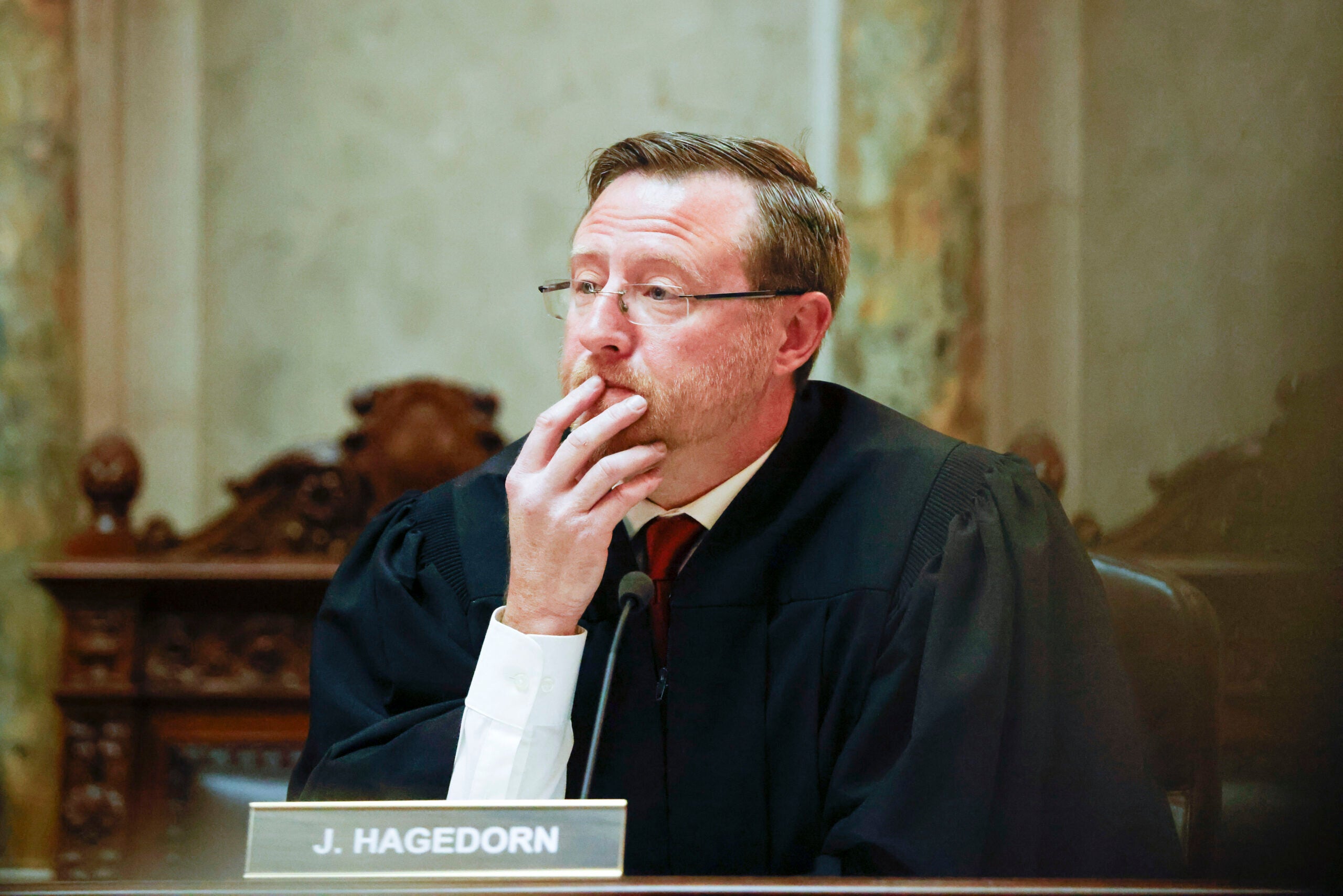Seven Wisconsin unions representing teachers and other public workers filed a lawsuit Thursday challenging the constitutionality of Act 10, which ended collective bargaining for most public employees.
The law has been challenged in court numerous times since its passage in 2011 when it was championed by former Republican Gov. Scott Walker. But this is the first lawsuit since the Wisconsin Supreme Court has flipped to liberal control.
Act 10 ended collective bargaining for most public unions by allowing them to bargain solely over base wage increases no greater than inflation. It also disallowed the automatic withdrawal of union dues, required annual recertification votes for unions, and forced public workers to pay more for health insurance and retirement benefits.
Stay informed on the latest news
Sign up for WPR’s email newsletter.
The lawsuit, filed by the teachers and other public workers on Thursday, alleges that the law’s exemption of some police, firefighters and other public safety workers from the bargaining restrictions violates the Wisconsin Constitution’s equal protection guarantee. The complaint notes that those exempted from the restrictions endorsed Walker in the 2010 gubernatorial election, while those subject to the restrictions did not.
Plaintiffs include the Abbotsford Education Association, AFSCME Local 47, AFSCME Local 1215, Beaver Dam Education Association, SEIU Wisconsin, Teaching Assistants Association Local 3220 and Teamsters Local 695.
The groups said they are filing the lawsuit now because of the “dire situation that exists in our workplaces.”
“Low pay, staffing shortages and worsening working conditions are hurting our ability to deliver public services to the communities that count on us every day,” the unions said in a press release. “With worker organizing on the rise, and public support for unions growing, workers are calling out Wisconsin law for what it is — blatant discrimination that limits workers’ freedom to earn a fair wage, provide for their families, advocate for safety on the job and enjoy a secure retirement.”

Assembly Speaker Robin Vos, R-Rochester, who voted for Act 10 as a member of the Legislature in 2011, issued a written statement warning of dire consequences if the lawsuit were to succeed.
“The repeal of Act 10 would bankrupt schools and local governments right after we gave them a historic funding increase,” Vos said. “This is another attempt by liberal special interest groups to undo the law to please their donors now that there’s been a shift in the court.”
In a social media post, Sen. Duey Stroebel, R-Cedarburg, said Act 10 has saved taxpayers $16.8 billion since it was signed into law.
“Now, left-wing activists are engaging in more lawfare because they expect the new liberal-activist majority to legislate from the bench,” Stroebel wrote. “Democrats are fighting to take our state backwards.”
This week, the nonpartisan Wisconsin Policy Forum released a report that shows despite recent pay raises, the median pay for teachers has fallen more than 12 percent since 2009 when adjusted for inflation. The report found gross median wages for teachers fell in 2012, following a wave of retirements the year after the passage of Act 10 and the loss of collective bargaining.
State Superintendent Jill Underly praised unions for filing the lawsuit, saying it puts children first.
“Returning collective bargaining rights to public sector employees will strengthen our educator workforce, and strengthening our educator workforce will improve our children’s education and create a stronger future for our state,” Underly said in a statement.
History of Act 10
Act 10 spurred massive protests that stretched on for weeks. It made Wisconsin the center of a national fight over union rights and catapulted Walker onto the national stage. It sparked an unsuccessful recall campaign, and laid the groundwork for Walker’s failed 2016 presidential bid. The law’s adoption led to a dramatic decrease in union membership across the state.
A similar argument was made in a federal lawsuit alleging that Act 10 violated the equal protection guarantee in the U.S. Constitution. But a federal appeals court in 2013 said the state was free to draw a line between public safety and other unions, and again ruled that the law was constitutional the following year.
The Wisconsin Supreme Court in 2014 also upheld the law as constitutional, rejecting a lawsuit brought by teachers and Milwaukee public workers. That case raised different arguments than the current lawsuit. And in 2019, a federal judge rejected a lawsuit brought by two arms of the International Union of Operating Engineers that argued the law violates free speech and free association under the First Amendment.
Wisconsin GOP spokesperson Matt Fisher said for more than a decade Act 10 has been supported by an overwhelming majority of Wisconsinites.
“This latest lawsuit is just another attempt to overrule the decisions by the Wisconsin State Supreme Court and two federal appeals courts affirming the constitutionality of Act 10,” Fisher said in a statement.
Protasiewicz said she’d consider recusing herself from Act 10 cases
If the case reaches the Wisconsin Supreme Court, it’s unclear who would actually hear it.
State Supreme Court Justice Janet Protasiewicz, whose win this year tilted majority control of the court 4-3 in favor of liberals, said during her campaign that she believes Act 10 is unconstitutional. She also told the Milwaukee Journal Sentinel she would consider recusing herself from any case challenging the law. Protasiewicz participated in protests against the law and signed the petition to recall Walker. If she were to recuse herself, the court would be evenly divided 3-3 between conservative and liberal justices.
If the latest lawsuit in Wisconsin is successful, all public sector workers who lost their collective bargaining power would have it restored. They would be treated the same as the police, firefighters and other public safety unions who remain exempt.
“The end of Act 10 would mean that we would have a real say again in our retirement plans, health care and time off — without the threat of loss of our union every year,” Wayne Rasmussen, who works for the Racine Unified School District, said in a statement.
Rasmussen is one of three individuals named in the lawsuit along with the unions. He is vice president of the Service Employees International Union of Wisconsin, which represents health care workers and others.
Editor’s note: WPR’s Shawn Johnson contributed to this report.
This story has been updated to clarify Justice Protasiewicz would consider recusing herself from cases related to Act 10.
Wisconsin Public Radio, © Copyright 2025, Board of Regents of the University of Wisconsin System and Wisconsin Educational Communications Board.




